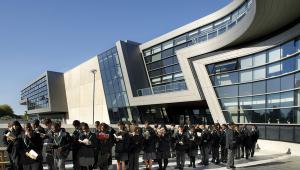The education secretary, Michael Gove, is reported to be considering a change to the Schools Admissions Code that would allow successful schools actively to recruit pupils entitled to free school meals from outside their catchment area. The change has been greeted with predictable shrieks of 'social engineering' from the right-wing media and claims by Margaret Morrissey, who runs an organisation called 'Parents Outloud' that it would 'shunt' parents to 'the bottom of the list.'
But Gove is absolutely right to look for ways to ensure that new academies and free schools - which are more likely than Labour's academies to be in better off areas - are not simply ghettoised by the middle classes. Poorer parents are too often already 'shunted' to the bottom of the list by virtue of where they live. The fact is that the use of catchment areas as the main admissions criterion by urban schools ensures that many of the best schools exclude poorer pupils not because they go out of their way to do so, but because they simply cannot afford to live near enough to the school to get in.
With the 2006 Education and Inspections Act, the new School Admissions Code made it easier for schools to combat this by introducing either ability bands or random allocation (lotteries). A growing number of academies use this criteria - often within a wider catchment area than the neighbourhood around the school - to ensure a balanced intake.
In fact, middle-class families can benefit from this too, as the Brighton experiment showed (in that case, catchments were drawn largely for their benefit), since it at least gives them a chance of getting their child into a school otherwise closed to them. Those who can lose are those who have moved into an artificial catchment area to get into a particular school, though it makes sense for schools to provide a proportion of places for those living very near a school as well as a proportion that is open to wider competition.
Gove's proposal would give schools another way of widening their intake, by allowing them actively to recruit poorer pupils, presumably by setting aside a number of places for those entitled to free school meals (FSM). There is a critique of FSM as the measure, in that it misses a lot of youngsters from families of modest means, but the principle is a good one. And if the new pupil premium - provided it is additional and significant - is to work, good schools must have more than an incentive to recruit poorer pupils, they need the means to do so as well.
That said, there are two other aspects of the 2006 reforms that need a shot in the arm, if this scheme is to work. The first is the entitlement to free transport to any one of three local schools (rather than that nominated by the local authority, as before). This needs to be better publicised, and must not be a victim of the Chancellor's cuts.
The second is the choice adviser. As I wrote last year, the idea of people actively helping poorer families to make choices has had a patchy record. But it could be revitalised as a Big Society idea, with successful people from poorer communities providing the advice at crucial times during the year, and active rather than passive efforts to promote good choices.
Of course, Ed Balls is right to point out that Labour's academies, by being placed within poorer communities, are making a huge difference to many poorer families. But that doesn't mean his successor is wrong to find ways to redress the imbalanced intakes of some of our more successful schools at the same time.
Conor Ryan was senior adviser on education to David Blunkett and Tony Blair. He blogs at Conor’s Commentary











